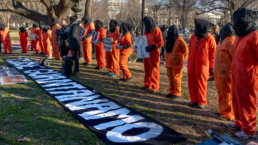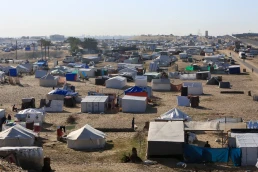Biden administration’s proposal to send Haitian migrants to Guantánamo Bay would repeat a racist and xenophobic past, immigration advocates say.
by Alexandra Martinez, Prism
According to a report from NBC News, the Biden administration could soon divert Haitian migrants and asylum seekers to a facility in Guantánamo Bay, Cuba before they arrive in the U.S. In the wake of a violent gang takeover in Haiti, thousands of Haitians are expected to continue fleeing the country, which has led to talks between the White House National Security Council and the Department of Homeland Security about expanding capacity at Guantánamo Bay in anticipation. Haitian immigration advocates say sending these migrants to Guantánamo Bay would be repeating the history of racist practices routinely inflicted upon the Haitian community while also adding another hurdle in their quest for a safer future.

“We know that there is an epidemic of cholera that’s rising in the country,” said Tessa Petit, executive director of Florida Immigrant Coalition. “We know that there are a lot of safety issues. Last Sunday, 17 people were killed by gangs, and that was one incident. My concern is, why is it that the country’s conditions are not taken into consideration to justify humanitarian parole for Haitians?”
If the plan takes place, it would not be the first time the U.S. sent Haitian migrants to the Migrant Operations Center on Guantánamo Bay. While not part of the notorious prison that incarcerated and tortured hundreds of Muslim men at the height of the U.S. invasion of Iraq and Afghanistan, the center has a history of mistreating migrants, especially Haitians. In 1991, over 32,000 Haitian migrants fled Haiti after a military dictatorship overthrew President Jean-Bertrand Aristide. Migrants were taken to Guantánamo Bay to pre-screen their asylum claims. but those who were detained had “no substantive rights” and were punished with solitary confinement when they protested the camp’s poor conditions. According to the Guantánamo Memory Project, women underwent humiliating physical exams and were forced to sleep on the ground like animals, and those who tested positive for HIV were quarantined in a part of the facility called Camp Bulkeley. There, refugees also experienced poor living conditions, such as rotten food and coerced medical testing, and were severely beaten when they demanded information on their seemingly indefinite detainment. Migrants were eventually released when Judge Sterling Johnson Jr. ordered the camp’s closure in 1993, ruling it unconstitutional and describing it as an “HIV prison camp.”
Recent Posts
Stop Israel’s Dystopian “Humanitarian City” Plan—Before It’s Too Late
July 11, 2025
Take Action Now For the past 20 months, the world has watched—and largely enabled—a genocidal campaign in Gaza. Over 55,000 Palestinians have been…
The “Liberal” International Order Is Criminalizing Palestine Protests
July 11, 2025
Take Action Now As Western governments repress Palestine solidarity and enable Israel’s impunity, the “liberal international order” is no longer…
Politicians Are Betraying Gen Z On Climate
July 10, 2025
Take Action Now While Gen-Zers thrift, knit, crochet, and find other ways to reduce our footprints, Trump and the GOP are greenlighting more climate…
Trump’s Deportation Threat Against Zohran Mamdani Is Shameful
July 10, 2025
Take Action Now In only half a year of Donald Trump’s presidency, he and his allies have turned deportation into an explicitly political threat…




